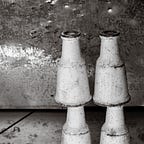There’s Some Confusion Around the Meaning of the Word ‘Confusion’
It’s almost dusk. I sit on a recliner at a co-worker’s backyard BBQ. The people nearest me resemble multibeam wavelengths of yellowish-blue light. One of them, a woman, says, “In lieu of human contact, I suggest retreating further into the subconscious realm.”
She hands me a topographical map of the ocean floor, crisscrossed with illegible annotations. One large section of the map is blurry and undecipherable.
The woman shrugs. “Think of that part as your distant past.”
Because language has gone missing from our understanding of external phenomena, the process through which we generate ideas remains elusive.
More simply put, the BBQ is poorly attended; friends and confidants are in short supply. Long term memory decays over time, leaving irregular snippets of data in its wake in which I envision alternate realities.
In one of these realities, an army of people scrub the floors and walls of this person’s home in nothing but suggestive undergarments. In another, my inquiries reveal a man with horns and a rough beard. A lanyard dangles loosely from his collar. He says, “Some say that professional agility requires sophisticated motor skills and swipe card access.”
Later that evening, I notice him helming the Weber, his lanyard nowhere to be seen.
After all the BBQ utensils have been polished and arranged for use, I place my faith in a signaling codebook of someone else’s design. In the absence of scientific evidence, I turn to leeches, pungent herbal poultices and other folk remedies.
Pieces of exotic bark are stuffed into a blender and shredded, along with pumpkin skins, caraway seeds and other (mostly) unidentified powders. The mixture is then poured into a tall ceramic vessel and passed around. Everyone in attendance takes a deep drink. Hallucinogenic visions ensue. The last rays of the sun pour over the fence. Patterns in the shrubbery are mistaken for human shapes, which have somehow glommed together.
A short catalog of attendees:
There is one among us whose crystals form organically. Their breath is rapid, shallow and they constantly appear to be self-critiquing as they go. These traits are evident in miniscule striations and involuntary muscle twitches.
There is another who tends to overstate the protein component of unidentified taxa. For them, it seems, form and function are the main rallying point. A small spot of mustard hides in the upper corner of their lips.
Another one stitches their mouth shut with jute thread and copper fiber. The moon rises and illuminates the proponents of descriptive profiling.
The woman who says she avoids human contact draws me in close and says, “Individual agency is only possible from within a collective unit.”
Sound and color evolve from the same line of source code.
Hours later, I emerge from this murky realm only to find the windows of the house are covered in condensation. The kitchen counter is overloaded with condiment bottles and dirty dishes. I recognize the remnants of some of the meals that have been eaten here. Even the container with recyclables is overflowing with nostalgia. Moosehead. Schlitz. RC Cola.
In summary, names are the only things which differentiate the decades.
I find my hands deep in the kitchen sink, waving a cloth over the rims of plates and cups in the warm sudsy water. The sensation is not unpleasant. Other BBQ attendees try to jostle me out of the way. I brush their protests aside, “Conventional wisdom tells us the depths of the ocean are uninhabited.”
I say that, but even I don’t believe in the validity of my own memories.
It has been noted here and elsewhere throughout the text; an object is only mostly impermanent. Escape path lighting will not emit. Jars of ketchup and dressing shall be wiped off, turned upside down and placed in the door of the fridge.
And so, the way forward is blocked by site specific systems and piercing beams of light. The BBQ swimmers have abandoned the pool. We were all brought here for a reason, but the reason will not reveal itself. The skeptics who live here shall represent. Dry land is a lonely place.
Craig Foltz is the author of three books of poetry and/or prose (via Ugly Duckling and Compound) and his work has appeared in numerous anthologies and journals (Conjunctions, Fence, The Diagram, etc.). His forthcoming book of hybrid writing, Petroglyphs, will be out sometime in 2024. He currently lives and works underneath a somewhat lonely mountain on the west coast of New Zealand. Find out more and send collaborative proposals via: www.craigfoltz.com
